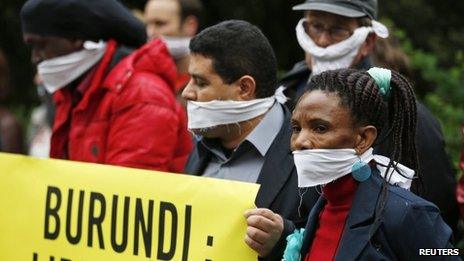Burundi's Pierre Nkurunziza approves media law
- Published

Burundi's President Pierre Nkurunziza has approved a new media law which critics have condemned as an attack on press freedom.
The law forbids reporting on matters which could undermine national security, public order or the economy.
It marked a "black day for freedom of information" in Burundi, campaign group Reporters Without Borders said.
Mr Nkurunziza is a former rebel leader who was elected president at the end of a brutal civil war in 2005.
He was re-elected in 2010 in polls which were boycotted by the opposition.
'Heavy-handed'
Mr Nkurunziza's spokesman Leonidas Hatungimana said the president had approved the law after it was passed by the House of Representatives and Senate.
Ruling party officials say the law will help professionalise the media and ensure that journalists do not incite hatred in a country where some 300,000 people died in ethnic conflict between 1994 and 2005.
However, Reporters Without Borders said Burundi had "gone backwards, more than 20 years".
"The new law restricts journalists' ability to do investigative reporting, weakens protection for sources, increases fines and requires all journalists to have a university degree regardless of their work experience," it added.
On 31 May, Burundi's National Communication Council (CNC) imposed a one-month ban on the popular Iwacu newspaper's online forum because it claimed readers' comments breached the law by "endangering national unity, public order and security, incitement to ethnic hatred, justification of crimes, and insults to the head of state", said campaign group Human Rights Watch.
"The CNC's decision to suspend a readers' forum is unnecessarily heavy-handed and punitive," said Daniel Bekele, Africa director at Human Rights Watch.
In March, Hassan Ruvakuki, a journalist with local radio station Bonesha FM, was released from prison on health grounds after spending 15 months behind bars.
He had been sentenced to three years in prison after being convicted of working for a criminal group.
He denied the charge.
- Published26 June 2012
- Published4 November 2022
- Published19 July 2011